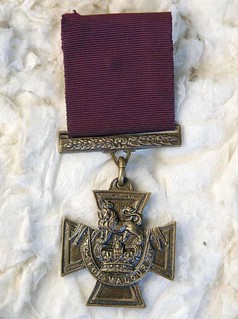
PREV ARTICLE
NEXT ARTICLE
FULL ISSUE
PREV FULL ISSUE
VICTORIA CROSS NOT MADE FROM CAPTURED GUNSIf you repeat a story often enough it comes to be seen as true. And in time it can actually come true. One researcher looked into the story of where the metal for Victoria Cross medals came from. Here's an excerpt from The Guardian. -Editor
Its long history is filled with true stories of great bravery. But one long-held belief – that Victoria Cross medals were made from enemy guns captured during the Crimean war against Russia – is unlikely to be true, and originated instead from speculation in the press, according to new research. Instituted by Queen Victoria, the Victoria Cross is Britain’s highest award for valour in war and has been awarded 1,358 times. Dr Andrew Marriott, a retired lieutenant colonel and visiting researcher at Newcastle University, has concluded that it is “highly implausible” that the medals came from Russian guns after the victory at the siege of Sevastapol in 1855. His research led him to a newspaper report at the time, asserting that they did come from the captured guns. He also found a letter in the Times from a Crimean veteran suggesting the same thing, and so, he says, the myth was born. Using x-ray fluorescence scans to examine the composition of Victoria Cross medals from 1856 to 2013, the research showed that part-way through the first world war, and again during the second world war, there were noticeable changes in composition, when compared with the 19th-century medals. The only contemporary record of a Sevastopol connection is a newspaper report of the medal ceremony in Hyde Park in 1857. The correspondent most likely conflated various stories circulating about the redistribution and recycling of captured Crimean guns.” The 64-year-old, who spent 30 years in the Royal Regiment of Fusiliers, explained that Hancocks Jewellers in London has been the sole producer of the medal since its inception. But during the first world war, Hancocks was forced to ask the War Office for a resupply of metal and, believing the myth that had been created, they turned to captured guns. Marriott said: “Hancocks were running out of metal so asked the War Office for a resupply and it’s probable that staff in the War Office, who were probably thinking about other things than the Victoria Cross, looked at each other and asked, where do you get this metal from? By then there would have been a tradition about Sevastopol guns, so a delegation would have been sent to cut off bits of guns to supply to Hancocks.” The current source of Victoria Cross metal is thought to be a cascabel – the round protrusion at the back of a cannon – stored at a Ministry of Defence depot in Donnington, Shropshire. Published in Post-Medieval Archaeology, the research found historical evidence that this cascabel may have been taken from a gun captured during the second Anglo-Chinese war of 1860, three years after the first Victoria Cross awards were made. “While it’s unlikely that even the earliest medals came from the ordnance captured at Sevastopol, it is clear that most of the VCs awarded since the first world war have plausibly been sourced from the cascabels of captured guns – an important and symbolic fact for those who have received the honour in recognition of their bravery,” Marriott said. To read the complete article, see:
Wayne Homren, Editor The Numismatic Bibliomania Society is a non-profit organization promoting numismatic literature. See our web site at coinbooks.org. To submit items for publication in The E-Sylum, write to the Editor at this address: whomren@gmail.com To subscribe go to: https://my.binhost.com/lists/listinfo/esylum All Rights Reserved. NBS Home Page Contact the NBS webmaster 
|
